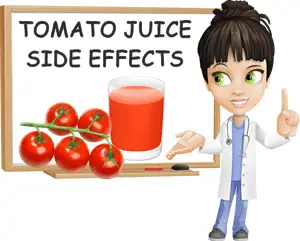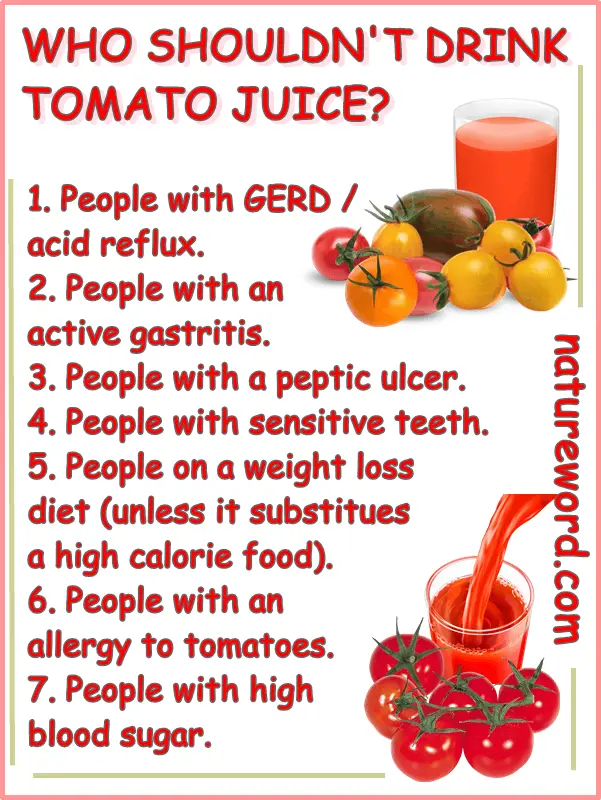Tomato juice is a great juice to drink for summer, full of electrolytes and hydrating and good for blood pressure, brain fog and headaches. But drinking tomato juice isn’t good for everyone.
While there are many benefits to the vegetable juice that doubles as a fruit juice, for some people the side effects greatly outweigh the benefits.
Find out below who shouldn’t drink tomato juice and why the juice just isn’t good for everyone.
Tomato juice: who is it bad for?
People with acid reflux: tomato juice triggers and worsens acid reflux
If you have acid reflux disease, formally known as GERD (gastroesophageal reflux disease), then tomato juice is likely not good for you. Tomatoes are naturally acidic foods, not acidic as in pH acidic, but acidic as in they contain organic acids, hence their tingly taste. Tomato juice is also acidic, and processed tomato juice, that is, tomato juice that has been pasteurized or cooked, becomes even more acidic (as a side note, that’s why people tend to add some sugar to their tomato sauce to balance the acidity).

Drinking tomato juice will add to the existing hyperacidity in acid reflux disease and favor the backflow of stomach juices and more severe acid reflux episodes. Drinking tomato juice can trigger an acid reflux episode even in people without a history of the disease, and also makes an existing disease worse.
Of all the foods to avoid in acid reflux, tomatoes and byproducts such as juice and especially paste and concentrate top the list.
Find out what other foods to avoid with acid reflux. Also read more about the effects of eating tomatoes for acid reflux and heartburn.
People with gastritis: tomato juice flares up gastritis
Tomato juice doesn’t cause gastritis by itself, but having it with an active gastritis can cause flareups in the condition. And the reason is the same as in acid reflux disease: drinking tomato juice causes stomach acidity.
Gastritis is essentially the inflammation of the stomach lining. It is characterized by a state of hyperacidity and causes symptoms such as regurgitating stomach juices (acid reflux), heartburn, a bad, usually sour or acidic taste in the mouth, stomach pain, excessive burping, bloating and more.
To get rid of gastritis for good, in addition to medication prescribed by your doctor, dietary changes are mandatory. Not drinking coffee, alcohol and acidic juices such as orange juice, lemon juice, pickle juice and tomato juice are some of the top dietary changes required in a gastritis diet. Note: you also need to avoid coffee, processed foods, fried foods, heavy foods and foods high in fat, spicy foods and also very high-fiber foods.
While tomatoes and their byproducts are generally bad for gastritis, not all are equally bad. For example, fresh tomato juice made by cold-pressing tomatoes, preferably optimally ripe and from low acidic varieties, tends to be less irritating on the stomach. By comparison, processed tomato juice such as canned tomato juice which doesn’t necessarily have to be made from fresh tomatoes (it can be obtained from tomato paste or concentrate), is the most irritating on the stomach and a lot worse for gastritis.

People with a peptic ulcer: tomato juice is irritating
A peptic ulcer is a sore or open wound on the lining of the stomach (gastric ulcer), lower part of the esophagus lining or the first part of the intestinal tract (duodenal ulcer).
Eating and drinking anything that stimulates the production of gastric acid and triggers acid reflux can exacerbate the condition and cause flare ups.
Eating a relatively bland diet, predominantly vegetarian, ideally also low in fat, and excluding processed foods and fried foods as well as spicy, sour, fermented and acidic foods and beverages are recommended for peptic ulcer sufferers.
Acidic, sour and fermented juices such as lemon juice, orange juice, lime juice, pickle juice or pickled cabbage juice, and also tomato juice can exacerbate the digestive condition and predispose to complications such as bleeding.
People with teeth sensitivity: tomato juice is acidic and sensitizes teeth
If you have sensitive teeth, then acidic foodstuff such as tomato juice can make your teeth sensitivity worse. Tomato juice is a source of tart organic acids and will cause teeth sensitivity and even pain in those with already sensitive teeth.
But if tomato juice is still something you would like to drink or eat, either because you like the taste or because you want to enjoy its wonderful benefits for health, then you can try cold-pressed tomato juice made from fresh tomatoes. Alternatively, you can go for yellow tomato juice, also cold-pressed, instead of the more acidic red.
If it’s something you would much rather buy, check the label to see if it’s pure tomato juice, if it’s made from fresh tomatoes, not tomato paste or concentrate, and if it has other ingredients added (e.g. preservatives, spices such as onion or garlic powder, oils, sweetening agents, food dyes, flavor enhancers, acidity correctors).
People on a diet: juices don’t satiate and make you eat again
Fruit and vegetable juices are not something you want to eat or drink when you are on a diet, unless it’s for weight gain. Losing weight, whatever the amount, implies reducing your daily intake of calories in order to create a calorie deficit. By eating less than you need, your body taps into its fat reserves and you lose weight.
See my 10 tips on how to eat 100 calories less a day.
But with juices, tomato juice included, you are risking eating more calories instead of less, if the juice is something you have outside of a meal, as a treat. Pure tomato juice lacks fiber or even pulp and that means it’s not satiating. You will get hungry fairly quickly and will have to eat again soon, sabotaging your calorie deficit for the day.
However, if you use it within a meal, to substitute some other ingredient that is high in calories, it can work for a weight loss diet. For example, instead of a carbonara pasta, you can have a diet serving of pasta, preferably whole wheat, with 1 tablespoon of extravirgin olive oil, 100 grams of fresh tomato juice, with pulp, and 20 grams of grated parmesan. This entire meal is just under 500 calories.
Check out the recommended portion size for weight loss of pasta, rice and more.
People with tomato allergy
People allergic to tomatoes should avoid the botanical fruit and culinary vegetable in all forms and preparations, including juice, unless otherwise advised by an allergy specialist. A food allergy is a serious health issue that can easily escalate and lead to breathing difficulties that put a person at risk for anaphylactic shock.
People with high blood sugar, if intake is too frequent or excessive
Pure tomato juice is neither too high in carbs, nor too high in sugar. In fact, 100% pure tomato juice has around 11 grams of carbs per 245 milliliter cup and under 6.5 grams of actual sugar (average values). However, having it too often and in too large amounts can raise blood sugar levels.
If you need to control your blood sugar, then a great way to bring down your levels is to address your diet and exclude certain types of foods. Avoiding fruit juices such as orange juice, apple, cherry and even tomato, and vegetable juices too is a good way to lower you intake of sugar for better blood sugar control.
Excluding processed foods and limiting baked goods to one serving a week are other good examples of how you can achieve healthier blood sugar levels. If you crave something sweet, then go for whole fruit instead of fruit juices to get fiber that helps satiate and temper the rise in blood sugar. Also see who shouldn’t drink raspberry juice.
What are the benefits of tomato juice?
What makes tomato juice good for you is its natural makeup. High in water (it’s close to 95% water) and a source of electrolytes, tomato juice is especially good for cardiovascular health, helping maintain a good blood volume and lower blood pressure numbers that are too high.
Drinking tomato juice boosts vitality and exerts a tonic, energizing action that contributes to a general feeling of wellbeing. The juice is anti-inflammatory and antioxidant, and naturally rich in vitamin C. It is an important source of benefits for teeth and gums and an anti-aging food product.
Discover more benefits of drinking tomato juice.
